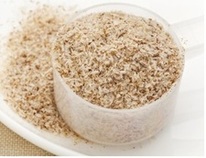
They are mainly used as an add-on treatment for IBS and hypercholesterolaemia. The improvement of diarrhoea, and a colon cleasing action (in those suffering from IBS) and a reduction of coronary heart disease (CHD) events (in those suffering from high cholesterol levels) are the benefits this seeds offer.
On the other hand, the long term ingestion of Psyllium seeds might give abdominal cramping, increased flatulence (increased passing of bowel wind) and constipation.
Psyllium seeds are contraindicated in case of oesophageal and gastrointestinal obstruction or difficult swallowing and also in case of fecal impaction, symptoms of appendicitis (lower right abdominal pain, nausea/vomiting, reduced/absent bowel motions, high temperature, altered general state), gastritis or gastro/duodenal ulcers, rectal bleeding.
Dosing: 1 teaspoon or tablespoon of seeds in 8 oz (~ 240 ml) of water for up to three times per day. An increased daily ingestion of water (fluids) is recommended during the treatment with these seeds.

 RSS Feed
RSS Feed